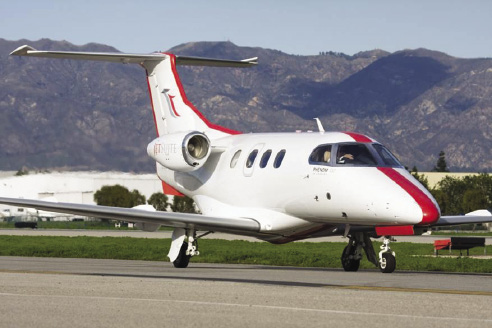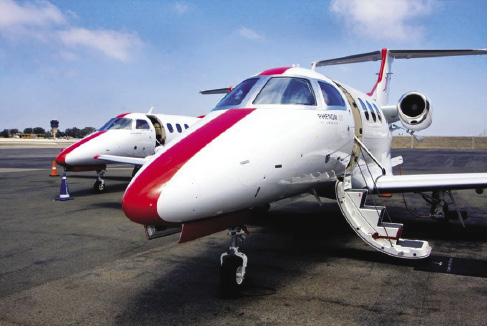


![]()
ONLINE

Democratizing Private Jets
Editors’ Note
Alex Wilcox has held his current post since July 2007. Before this, he was Founding President and COO of Kingfisher Airlines in India. He was also a Founding Director for JetBlue Airways and Director Product Development-Airports North America for Virgin Atlantic Airways. Wilcox was educated at the University of Vermont.
Company Brief
JetSuite (www.JetSuite.com) is redefining private aviation as the first and only private jet operator to exclusively offer a fleet of all-new Embraer Phenom 100 aircraft, the most fuel-efficient jet in its class. The company’s vision is to offer private air travel to more people than ever before through affordable, no obligation programs. JetSuite provides service from areas throughout the Southwest, Texas, and the Northeast to and from airports in the United States, Canada, and Mexico. JetSuite is rated Platinum by ARG/US, the highest possible safety rating in the private jet industry. Based in Southern California, JetSuite was founded in 2006 and first took flight in early 2009.
What have you done to differentiate the JetSuite brand and develop it into an innovator in this industry?
Our goal is to provide private jet travel to more people than ever before. We’ve tried to democratize the airline and make it more populist than most. The best evidence of that is how we market our empty legs. All private jet providers have lots of empty flights, so we have taken that unused resource and provided it to the general public via Facebook.
We sell those empty legs for $499. So you can take flights from completely random points but you never know when one will be available in your market. We make it available to anybody that can come up with $500 which, for four people to travel via private jet, is unbeatable.
We adopted a lot of Southwest Airlines’ playbook in terms of how to run a low-cost carrier. They fly a single fleet type and they started off in a region where it’s easier to operate, so costs are lower, which allows you to provide service to more people; and they do just one thing and they’re the best at it. So we try to be the best in our market, which is regional private jet travel. And because of that cost and business plan focus, we can provide lower costs, which means more people can afford it.

Embraer Phenom 100
What is the strength of your fleet and does using only one plane type limit your capability in terms of the type of flights you can accommodate?
No matter what size airplane you like, the average private jet mission is 700 miles and the average passenger load is 2.2 – that is true of all types of private jets. Also, over 70 percent of private jet flights are flown less than 1,000 miles and over 90 percent have fewer than five people onboard.
The Phenom is a game-changer – it has four seats and a 1,000-mile range, and we determined quickly that with that small airplane, we can cover almost three-quarters of the market. Our plane burns a half to a third of the fuel of our competitors’ airplanes, and yet, it has a taller, wider cabin. So we have a better product with lower cost. The airplane is also more reliable. Can we go from New York to LA non-stop? No. But that’s not our mission. We don’t sell $40,000 coast-to-coast flights; we sell $4,000 trips to places that people can’t get to on an airline.
Your main core is your membership. Where is that membership coming from?
Our SuiteKey Membership is our mainstay and unlike most private jet operators, we don’t rely on brokers for the majority of our business. We sell direct to the public; we trade on our own name and we operate our own planes. It turns out there are not many people who do that, including some of the bigger brand names out there.
We sell memberships to people who have a current need to travel in the Southwest, Northeast, and Texas because that is where we operate. It’s good for us because we get advanced sales and people don’t have to price out every single trip they take – they’ll book with us once and then trust we’ll always give them our lowest fare. Moreover, they can also see very simply on our Web site what their fare will be for any trip – to the penny. No one else in the industry can do that.

Embraer Phenom 100
Are there opportunities in the future to broaden into other markets?
There are significant opportunities. Two-thirds of the U.S. population is east of the Mississippi, so we have started our foray into the Northeast this summer. That is the deepest well, but it’s also the most challenging. The congestion and delays are some of the reasons that Southwest Airlines didn’t go to the Northeast for a while and why we haven’t gotten there until now.
The Phenom 100 is not the perfect airplane to take from New York to Florida but it’s the ideal airplane to take from New York to Chicago, Montreal, D.C., and the Carolinas.
Is it tough to get the message across that value doesn’t have to be about price?
Yes. When people see our prices, they figure it can’t be a “real” jet and they are very pleasantly surprised when they get onboard. We send a post-flight survey to all of our clients, asking them to rate the service and everything is on a scale of 1 to 5. I haven’t seen anything less than 4 in any category in months.
Did you always have an entrepreneurial drive?
I think so. I had the privilege of working for some great entrepreneurs. It’s having the opportunity to change an industry that excites me. With JetBlue, we did it with the single fleet type out of JFK with brand new jets and live TVs. At JetSuite, we saw this category-killer airplane that was going to make a huge difference. It deserved a new model – it would not have been enough to take this new airplane and put it in the old fractional model.
How critical is it to make sure your culture revolves around innovation?
It’s essential for us. Often innovation starts around a new technology, but the long-term strength of that innovation becomes the service levels and business model that technology enabled.
The capacity for innovation at airlines today seems to be limited to figuring out how to charge you for a glass of water and a boarding pass; they’re so desperate to figure out how to make money in this environment that all of their innovation is around pricing and almost none is around actual service. We haven’t forgotten that we are primarily in the service business and it is our service, our pilots, and our amazing people that bring our clients back.•